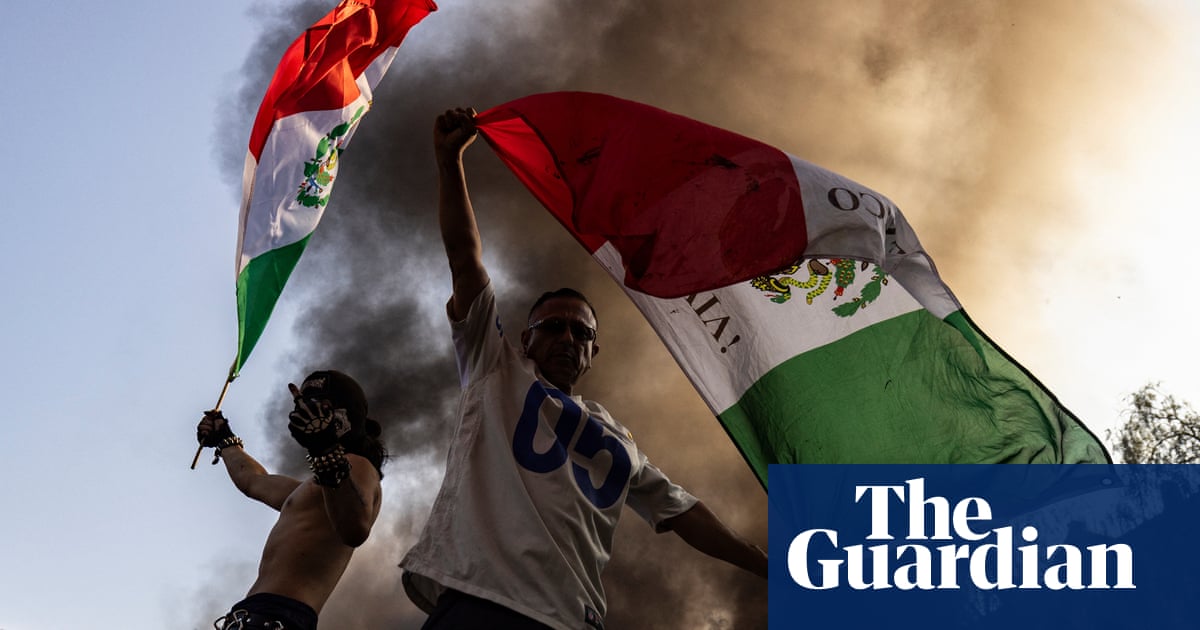Good morning.
Federal agents clashed with demonstrators in Los Angeles on Sunday aspolice used teargas and “less-lethal munitions” to disperse massive crowds of people protestingagainst Donald Trump’s immigration crackdown and his deployment of the California national guard against the will of the state’s elected leaders.
Thousands of Angelenos swamped the streets around city hall, the federal courthouse and a detention center where protesters arrested in the days before were being held. They also brought a major freeway to a standstill.
Vocal and boisterous, the crowd for large parts of the day was mostly peaceful. But tensions flared several times. On Sunday afternoon, police used teargas to disperse groups of protesters. Later in the evening officers fired round after round of flash-bangs in an attempt to push the protesters back up the freeway off-ramps.
When was the last time a president made a similar decision?Trump’s federalization of the guard troops is the first time an American president has used such power since the 1992 LA riots that followed the acquittal of four white police officers for brutally beating Black motorist Rodney King, and the first without a request by the governor since 1965.
Donald Trump’s new ban on travel to the US by citizens of a dozen countries, mainly in Africa and the Middle East,came into effectat midnight ET on Monday, more than eight years after his first travel ban sparked chaos, confusion, and months of legal battles.
The new proclamation, which Trump signed last week, “fully” restricts the nationals of Afghanistan, Myanmar, Chad, Republic of the Congo, Equatorial Guinea, Eritrea, Haiti, Iran, Libya, Somalia, Sudan and Yemen from entering the US. The entry of nationals of Burundi, Cuba, Laos, Sierra Leone, Togo, Turkmenistan and Venezuela will be partially restricted.
Unlike Trump’s first travel ban in 2017, which initially targeted citizens of seven Muslim-majority countries and was criticized as an unconstitutional “Muslim ban”, the new ban is broader, and legal experts said they expected it to withstand court challenges.
What do the countries have in common?While five of the countries on the new ban list are not majority-Muslim, including Republic of the Congo, Myanmar, Eritrea and Equatorial Guinea, as well as Haiti, the list does target citizens of non-white countries in the developing world, fueling criticisms that the ban is fundamentally racist andshaped by “bigotry”.
Israel’s militarytook control of a boat trying to deliver food to Palestinians in Gazain the early hours of Monday morning, and brought its crew of activists, including Greta Thunberg, to an Israeli port.
The Madleen was making a symbolic attempt to break the blockade of Gaza and to raise awareness of a looming “starvation crisis”. It was never likely to get through Israel’s naval blockade of the territory, where UN-backed experts have warned of looming famine, anddozens of people have been killed by Israeli forces trying to reach food distribution sites.
Attempting to reach Gaza by boat is risky. In May, another boat caught fire off Malta and issued an SOS after what the group said was an attack by Israeli drones. In 2010, nine activists were killed when Israeli commandos raided a small fleet of ships trying to take supplies to Gaza.
What’s the latest in Gaza?On Sunday, at least a dozen Palestinians were killed trying to get food, hit by Israeli gunfire as they headed towards two distribution centres run by a US and Israeli-backed logistics group. Israel said it fired warning shots at people who approached its forces.
The US treasury secretary, Scott Bessent, has warned the California governor, Gavin Newsom, that he would be guilty of “criminal tax evasion”if he withholds his state’s tax payments to the federal governmentamid threats of a funding cut byDonald Trump.
Top US and Chinese officials are due to meet inLondon for thenext stage of trade talks, with rare-earth minerals and advanced technology likely to be high on the agenda.
The British government’s efforts to keep details of its intelligence agencies’ involvement inthe CIA’s post-9/11 torture programhidden will face an “unprecedented” challengethis week as two cases are brought before a secretive court, the investigatory powers tribunal.
The pandemic laid bare the health and wealth disparities in the US, as Black people were three more times likely to be diagnosed with and die from coronavirus. For single Black women, the pandemic was a mix of isolation, loss of community and social connections and a return to the foundation of family. It was also an opportunity to create something new,writes Lottie L Joiner.
The world’s oceans are in worse health than realised,scientists say, as they warn that a key measurement shows we are “running out of time” to protect marine ecosystems. Ocean acidification, often called the “evil twin” of the climate crisis, is caused when carbon dioxide is rapidly absorbed by the ocean, leading to a fall in the pH level of the seawater.
“Feelgood” movies are often thought of as big-hearted romantic comedies, comforting classics or childhood favourites that still hold up decades later. In our series My Feelgood Movie,Guardian writers reflect on their go-to flickand explain why their pick is endlessly rewatchable.
First Thing is delivered to thousands of inboxes every weekday. If you’re not already signed up,subscribe now.
If you have any questions or comments about any of our newsletters please emailnewsletters@theguardian.com
